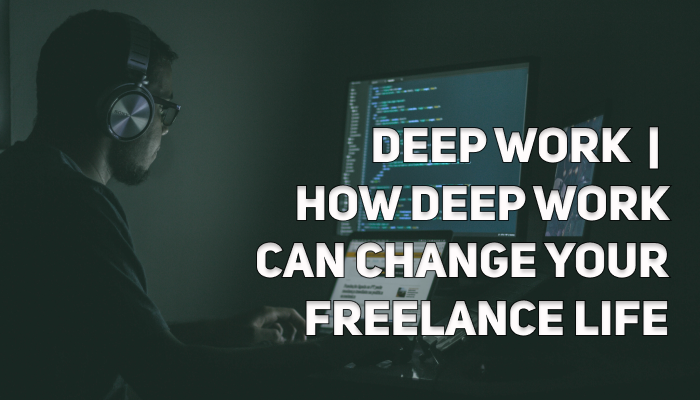
Perhaps, you’re already familiar with a bestselling Cal Newport’s book, Deep Work, and have been practicing some of the concepts laid out in the book. And if so, then you’ll still have something to take away with you after reading this article. And if not, then lucky for you, we’ll reiterate some of the ideas from the book and explain how you can manage to incorporate those concepts in your remote work routine.
From all the self-help concepts, deep work might come out as the most obvious, but nevertheless, the most efficient and powerful technique that can truly transform your working experience. Those tasks that could have taken months or weeks to accomplish, can be taken care of within days. Brainstorming and freewriting have never been easier with applying deep work techniques: you write non-stop distraction-free for a designated period of time until the very last drop of your current intellectual capacity, and, look at you, you might just as well finish a novel. Sounds promising, right? But trust me, fiction writers do exactly that. Even if you’re not a fiction writer, and your primary language is not English or Japanese, but rather Python or Java, deep work has hidden treasures for you too.

Without further ado, let’s get into it. What’s exactly a deep work? Deep work is a professional activity performed in a state of distraction-free concentration that pushes your mental capabilities to their limits. As examples, Newport holds up Carl Jung, Mark Twain, Woody Allen, and J.K.Rowling as perfect models who successfully practiced deep work in one way or another. For example, Woody Allen, the most prolific screenwriter ever, wrote and directed 44 films during 44 years between 1969 and 2013. Throughout this time, Allen never owned a computer and typed everything on his German manual typewriter. Allen rejected the distraction of the computer world to better concentrate on his art and achieve his artistic goals. Now, that could hardly apply to you, you might think because a developer without a computer is like a child without their toys. Wait a minute before you go, deep work principles are not limited to technophobic! Consider Bill Gates, for example, who conducted his famous “Think Weeks” twice a year, when he would isolate himself in his lakeside cottage and …well, read and think. Now, you might not happen to own a cottage by the lake, or that luxury to take days off work to just read and think, but you can infer the consistent pattern from it, right?
The hypothesis, Newport introduces, is that the ability to perform deep work is becoming extremely rare and thus, it’s becoming increasingly valuable. Consequently, those who are able to perform it will thrive in work and life. The book, therefore, is structured in such a way, as to convince you that the hypothesis is true, and then teach you to take advantage of this reality and train your brain to work in a deep state.
Now, assuming the hypothesis is true, let’s switch directly to the part where the author unveils some of the techniques to achieve this state.
The will, the author argues, is like a muscle. It can be trained and it can become tired. The truth is that willpower becomes depleted every time you use it. There’s no such thing as an infinite will; conversely, you can train yourself to extend your finite pool of willpower. Assuming you have all the good intentions at improving your productivity and are fully ready to dive into a deep state, you’ll be surprised to find out that good intentions are just not enough. What you need to do is to add routines and rituals to your working life to maintain the state of unbroken concentration.

In order to do just that, you’ll need to come up with a deep work schedule. Deep work can be productive only and if only there’s enough time scheduled for it to reach maximum cognitive intensity. Now, there’re several approaches to accomplish such a challenging task.
Bimodal philosophy believes that deep work can only be achieved if you allocate for it the whole day. This approach can work for those who have regular daytime jobs that don’t allow them to completely scratch off distractions. For example, if one of your core responsibilities is actually answering emails or chatting on Twitter, then you can’t just erase them without being frowned upon by your boss. Then take a day off work every now and then and do something that requires 100% concentration.
However, if you write code or fiction, you can allocate for deep work a couple of hours each day, better yet, four hours. And just keep at it. Meaning, do it every single day. This chain method belongs to the rhythmic philosophy where you work consistently and make a regular habit out of it. Newport gives an example of Brian Chappell, who before he introduced deep work into his schedule, was able to produce only a single chapter of his dissertation in a year; but as soon as he committed himself to work on it from 4 am to 7 am before his daytime job, he suddenly was able to achieve breakthrough both in his career and education. Working from 4 am to 7 am allowed Chappel to produce from 4 to 5 pages of academic writing per day.
Journalistic philosophy derives its approach from the journalistic ability to dive into writing on a moment’s notice. That way, you can go into a deep state whenever you have that moment. It can be free time or a moment of inspiration. However, this approach doesn’t suit deep work novices because it requires a lot of practice of distraction-free concentration. And in fact, one of the journalists featured in the book, namely Mason Currey, urged anyone to ignore inspiration and just commit yourself to work regardless.

How to make your deep work ritual effective? Think of where you work your best and have no distractions at all. Think of how long you need to work to achieve deep concentration state. Establish rules which you cannot cross. For example no Internet use, no mobile phone, etc. Determine how you’re going to support your work. For example, start only after you’ve drunk your morning cup of coffee or after you’ve walked half a mile, or only after you’ve ensured you have a stack of right food available to keep you through the deep state, etc.
What about the deep work itself? How to achieve the success of this endeavor? First off, Newport argues, it’s important to have a clear conspicuous goal. Ask yourself questions like what you are trying to achieve? And focus only on the most important goals. Then, devise a set of measuring tools against which you’re going to assess your progress. For example, the number of hours spent in deep work state, the number of written pages, or completion of a number of projects. Next, Newport advises keeping an illustrious scoreboard to record and track the measures that have been taken to achieve the goals and review those scoreboards on a weekly basis.

Now, what happens if your job is the Internet? Do you have to spend most of your time replying to messages, emails, surfing the web, etc.? Newport suggests scheduling off-Internet blocks of time when you shut off online communication completely and irreversibly. Under no circumstances go online and spend time browsing; instead, focus on your deep work here and now; only after you complete a set of challenges within that off-Internet time, you’re allowed to go online. Trust me, it’s easier said than done. But these offline moments are truly priceless.

Newport suggests quitting social media. That one point truly resonates with me because I was trying to do the same thing. I think, partly I did succeed. I used to have more than a thousand Facebook friends, a thousand followers on Twitter, and a couple of thousands or so followers on Instagram. I quitted all of those. During these wonderful times, I got married and had a kid. However, the nature of my work dictated that I had to return, at least partially to some of those social media, and I did. For Facebook, under a different identity, so that no one would have the urge to add me. And I now have about five Facebook friends whom I don’t know and that’s really cool. I have a working Twitter account with less than 300 followers and my Instagram is as quiet as it may get. I advise anyone to try and quit social media because quitting online communication (at least for a while) can lead to wonderful things in real life.
Another important takeaway from the book is putting more thought into your leisure time. Instead of using the Internet for fun, use it for research, education, collaboration, or don’t use it at all.
Overall, we’d recommend a deep work approach to anyone struggling with distraction and falling productivity. If you feel like eight hours of work are not enough to finish your daily assignments, then work seven hours, five of which in the deep state, and you’ll see how you’ll manage to accomplish goals that were otherwise unattainable to you before. The deep life won’t come easy, and it might not be for everybody. The deep work requires drastic changes to your habits and a generous amount of self-planning and organization. But is it worth it? Totally.






